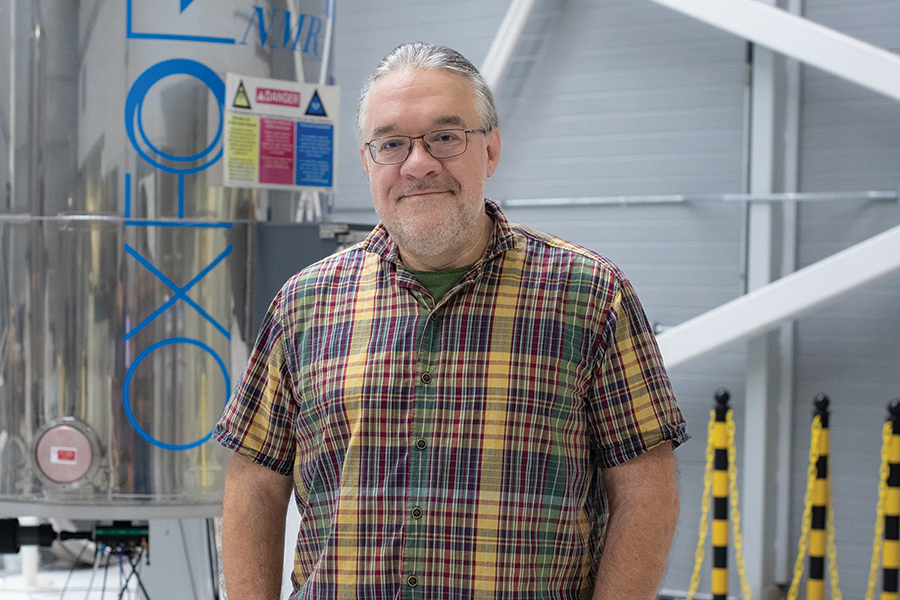Risk and Reward
Chemist Rob Schurko embraces uncertainty and reaps the rewards in research and in life

Some people are content to color inside the lines throughout their lives. Others, like Rob Schurko, can’t imagine a life without game-changing leaps of faith.
“When I received a job offer from Florida State University in 2019, it was an incredible opportunity but a huge risk; you never know if things will work out, especially when moving to a different country,” said Schurko, a professor in the Department of Chemistry and Biochemistry and director of the Nuclear Magnetic Resonance and Magnetic Resonance Imaging Facility at the FSU-headquartered National High Magnetic Field Laboratory.
“This decision was for the best. Sometimes I still pinch myself when walking around the lab. The sheer amount of research opportunities, instrumentation, and great intellects at FSU and the MagLab were a welcoming addition to such a drastic life change — especially through the COVID-19 pandemic years,” he continued.
Schurko, who was born in Winnipeg, Manitoba, Canada, was aware of FSU and the MagLab long before 2019. During his nearly two decades as a professor of chemistry at the University of Windsor in Ontario, he was able to travel and use the MagLab’s open-access facilities in his research into elements around the periodic table, including the platinum group elements. PGEs — iridium, osmium, palladium, rhodium and ruthenium — are some of the most rare and expensive elements on Earth and are used in numerous applications ranging from transportation to smartphone technology to medical devices to chemotherapy treatments to defense systems.
Moving to the U.S. may have been among Schurko’s most recent calculated risks, but it wasn’t the first. He was a first-generation college graduate when he earned bachelor’s and master’s degrees in chemistry from the University of Manitoba in 1992 and 1994 and when he completed his doctorate in chemistry at Dalhousie University in Nova Scotia in 1998. Although he struggled early on, his perseverance paid off — Schurko fell in love with research after a professor allowed him to observe magnetic resonance imaging techniques.
“In order to succeed, you have to take chances and try to the best of your abilities, but you also have to be prepared to fail... There’s no time wasted if you learn something and understand what you can do better the next time around.”
— Rob Schurko
“Since then, my life’s work has been focused on giving people who study organic, hybrid, and other materials the chance to see them from the perspective of the individual elements that compose them,” he said. “My work analyzes the molecular structure of platinum group elements and finds paths to so-called replacement metals that can be used in their place. Because PGEs are so rare and expensive, finding replacements may enhance the accessibility and cost-effectiveness of new advanced materials.”
As director of the NMR facility, Schurko headed creation of the MagLab’s Summer School on Solid-State NMR Spectroscopy, a full-circle moment — he attended a similar program as a student in Canada that showed him the strength of science and contributed to his research interests. The program coordinates tours, workshops, and lectures for upper-level undergraduate and graduate students, primarily from undergraduate institutions, historically Black colleges and universities, and Hispanic-serving institutions, in order to expose them to the high caliber work done at a national laboratory.
Running concurrently with the acclaimed MagLab User Summer School, which is geared toward advanced graduate students, postdoctoral associates, and early career investigators who wish to gain practical measurement experience, this newer program allows students with limited research experience the opportunity to learn about NMR, experimental setups, dynamic nuclear polarization and more. The first official session will be offered in May 2025.
The flip-side of Schurko’s love for research is his investment in teaching, including an emphasis on the importance of helping students connect to scientific subjects and build a strong, foundational understanding that will pay dividends as they continue their studies.
“I use digital animations to teach concepts of thermodynamics, quantum mechanics, molecular and atomic spectroscopy, and NMR,” Schurko said. “Demonstrations like this can bring to life what seem to be mundane chemical phenomena described by complex mathematics.”
His dedication to communicating the importance of science and the context of his research is something noticed and appreciated by both Schurko’s students and his colleagues.
“I’ve always noticed Dr. Schurko’s high level of clarity in both presentation and communication,” said Wei Yang, chemistry department chair. “He’s a great addition in any setting, and his calmness is an impressive yet overlooked trait for anyone in a leadership role.”
While he admits to sometimes feeling the pressure of holding three roles, Schurko said he deeply appreciates the differing perspectives these positions give him and the benefits of taking that risk six years ago.
“In order to succeed, you have to take chances and try to the best of your abilities, but you also have to be prepared to fail,” Schurko said. “When something doesn’t work out, it’s best to learn from it to make things better down the road. There’s no time wasted if you learn something and understand what you can do better the next time around.”
Bella Bozied is an FSU alumna who earned a bachelor’s degree in information, communication and technology with a dual major in editing, writing and media in 2024. She is currently pursuing a master’s degree in integrated marketing management communication with a certification in project management and is set to graduate in May 2026.
